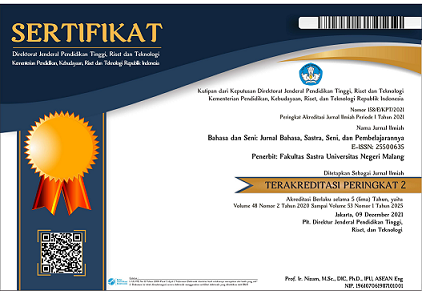Dunia Arab Saudi dan Islam dalam pandangan orang Indonesia: Narasi pekerja migran dalam novel Pelukis Gurun Pasir (2018) karya Fuad Abdurahman
Abstract
The world of Saudi Arabia and Islam in the perspectives of Indonesians: The narrative of migrant workers in Pelukis Gurun Pasir (2018) by Fuad Abdurahman
The world of Saudi Arabia in the diaspora experiences of Fuad Abdurahman is written in a novel entitled Pelukis Gurun Pasir (2018). The problems discussed in this study are: (1) the position of subject or author in the narrative structure of the text, (2) the author's relationship with the country of origin, and (3) the voices that appear within the migrant subject in dealing with Saudi Arabian tradition. The theory used is diaspora poetics, which emphasizes the concept of language expression as part of the subject's identity. The object of the research is Pelukis Gurun Pasir (2018) and the author's response to traditions in Saudi Arabia. The data include the narrative structure of the novel’s text, the ideas in the text, the author's biography, and diaspora discourse or social situations. The results show that the image of Saudi Arabian society tends to be evaluated negatively by emphasizing on the chaotic sexuality description of Arabic men, making Saudi Arabia a masculine country. In addition, the author finds tolerant Islamic values in Indonesia, which causes his longing to return to Indonesia.
Keywords: diaspora, atuhor, Saudi Arabia, narrative structure
Dunia Arab Saudi dan Islam dalam pandangan orang Indonesia: Narasi pekerja migran dalam novel Pelukis Gurun Pasir (2018) karya Fuad Abdurahman
Dunia Arab Saudi dalam pengalaman diaspora Fuad Abdurahman dituliskan dalam Pelukis Gurun Pasir (2018). Masalah yang dikaji dalam penelitian ini adalah (1) posisi subjek atau pengarang dalam tata naratif teks (2) hubungan pengarang dengan negeri asal, dan (3) suara-suara yang muncul dalam diri subjek migran dalam menghadapi tradisi Arab Saudi. Teori yang digunakan adalah puitika diaspora yang menekan pada konsep ekpresi bahasa sebagai bagian dari identitas subjek. Objek kajian penelitian adalah novel Pelukis Gurun Pasir (2018) dan tanggapan pengarang terhadap tradisi di Arab Saudi. Data yang digunakan adalah tata naratif teks novel, gagasan yang muncul dalam teks, riwayat pengarang, dan wacana diaspora atau situasi sosial. Hasil penelitian ini adalah bahwa citra masyarakat Arab Saudi cenderung dinilai secara negatif dengan menekankan pada deskripsi seksualitas yang kacau dari laki-laki Arab sehingga Arab Saudi adalah negeri maskulin. Selain itu, pengarang justru menemukan nilai-nilai keislaman yang toleran berada di Indonesia sehingga pengarang merindukan pulang ke Indonesia.
Kata Kunci: diaspora, pengarang, Arab Saudi, tata naratif
Full Text:
PDFReferences
Abdurahman, F. (2018). Pelukis gurun pasir, petualangan pekerja seni di Arab Saudi. Republika Penerbit.
Adji, S. E. P. (2018). Sastra diaspora-Indonesia: Karya imigran Indonesia di Amerika tahun 2010-an. Jurnal Ilmiah Kebudayaan Sintesis, 12(1), 1–15. https://doi.org/10.24071/sin.v12i1.1737
Bakhtin, M. (1973). Problems of Dostoevsky’s poetics. University of Michigan Press.
Bauman, Z. (1978). Hermeneutics and social sciences. Columbia University Press.
Baynham, M. (2006). Performing self, family and community in Morrocan narratives of migration and settlement. In A. de Fina (Ed.), Discourse and Identity (pp. 376–397). Cambridge University Press.
Bhabha, H. K. (1994). The location of culture. Routledge.
Bose, B., & Gandhi, L. (2000). Postcolonial theory: A critical introduction. World Literature Today, 74(1). https://doi.org/10.2307/40155562
Chair, B. M. (2018). Ambivalensi dan krisis identitas dalam kumpulan cerpen "Cucu Tukang Perang" karya Soeprijadi Tomodihardjo; Sebuah tinjauan pascakolonial. KENOSIS: Jurnal Kajian Teologi, 4(2), 156–169. https://doi.org/DOI:10.37196/kenosis.v4i2.65
Gandhi, L. (1998). Postcolonial theory. Edinburgh University Press Ltd.
Genette, G. (1997). Paratexts: Thresholds of interpretation. Cambridge University Press.
Gilroy, P. (1997). Diaspora and the detours of identity. In K. Woodward (Ed.), Identity and difference (pp. 299–346). SAGE Publications.
Hall, S. (1990). Cultural identity and diaspora. In J. Rutherford (Ed.), Identity: Community, culture, and difference (pp. 222–237). Lawrence & Wishart.
Harimurti, A. (2018). Agam Wispi: Sastra untuk manusia. Lensa Budaya, 13(1), 13–25.
Mahroum, S., Eldridge, C. B., & Daar, A. (2006). Transnational diaspora options: How developing countries could benefit from their emigrant populations. International Journal of Multicultural Societies, 08(01), 25-42.
McLeod, J. (2000). Beginning postcolonialism. Manchester University Press.
Moleong, L. J. (2007). Metodologi penelitian kualitatif. Remaja Rosdakarya.
Nasution, A. A. (2016). Hibriditas dalam novel Pulang karya Leila S Chudori: Kajian pascakolonial. Universitas Gadjah Mada.
Said, E. W. (1978). Orientalisme. Pantheon Books.
Spivak, G. C. (2008). Outside in the teaching machine. Routledge.
Wijayanti, J. (2018). Identitas personal: Refigurasi pembantu rumah tangga tenaga kerja wanita di Hong Kong dalam teks Diary Buruh Migran karya Arsya Kirana. Kode Jurnal Bahasa, 7(1), 21–32. https://doi.org/10.24114/kjb.v7i1.10114
Yunita, G. F. R., & Anggraini, P. (2020). Comparative study of nasionalism main characters in the novel Negeri van Oranje and Diary Buruh Migran. AKSIS: Jurnal Pendidikan Bahasa dan Sastra, 4(2), 230–251. https://doi.org/10.21009/AKSIS.040201
Zulikha, P. (2020). Agenda dan ideologi dalam novel Pelukis Gurun Pasir karya Fuad Abdurahman: Analisis sastra perjalanan Carl Thompson [Bachelor’s thesis, Universitas Gadjah Mada]. Universitas Gadjah Mada.
DOI: http://dx.doi.org/10.17977/um015v49i12021p122
Refbacks
- There are currently no refbacks.

This work is licensed under a Creative Commons Attribution 4.0 International License.

Dear Sir/Madam
We appreciate your continued confidence and trust in Bahasa dan Seni: Jurnal Bahasa, Sastra, Seni, dan Pengajarannya (JBS). In order to enhance the service, readability, and quality of JBS publications, we will be transitioning to a new website, https://citeus.um.ac.id/jbs, in collaboration with Digital Commons (Elsevier) starting in July 2024.
Sincerely
Yusuf Hanafi
(Editor in chief)
















2.png)